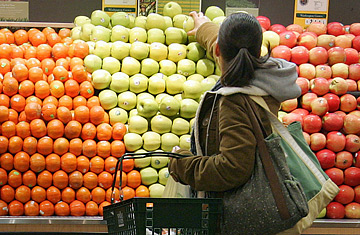
A woman selects apples while shopping in the produce section at Whole Foods in New York City.
While breast cancer survivors — like everyone else — should eat healthy foods, going overboard doesn't necessarily improve your chances of avoiding a recurrence of cancer, a new study suggests. Appearing in this week's issue of the Journal of the American Medical Association (JAMA), the study, called the Women's Healthy Eating and Living (WHEL) Randomized Trial, found that diets very high in fruits and vegetables do not appear to reduce the risk of breast cancer recurrence. This latest paper is one of several recent inquiries into the role of diet in cancer risk. Despite the widely held belief that the right diet can help fight cancer, recent findings have failed to definitely prove that.
The WHEL study, led by researchers at the University of California, San Diego, was designed to be more rigorous than previous research. It tracked 3,088 women aged 18 to 70, who had been treated for early stage breast cancer. The women were divided into two groups. The first group was asked to eat five servings a day of fruits and vegetables, a diet the National Cancer Institute recommends for everyone. The other group of women received intensive nutritional counseling — including cooking classes — to help them decrease their fat intake to 15% a day and increase their regular fiber intake to 30 grams a day. These women were instructed to ramp up their fruit and vegetable intake to about 12 servings a day.
Researchers tracked the women's diets between 1995 and 2000, and followed cases of breast cancer recurrence until 2006. By the end of the study, both groups of women had about the same number of breast cancer relapses and deaths. There were 518 relapses, with 256 in the "five-servings-a-day" group and 262 in the intervention group.
Of the 315 deaths reported, more than 80% were due to cancer. Among those deaths, 160 were in the "five-a-day" group and 155 were in the high-fruits-and-veggies group. "The main conclusion is that a woman who has been diagnosed with breast cancer doesn't need to go to extraordinary lengths to eat fruit and vegetables," says Dr. Cheryl Rock, a co-investigator of the study and professor of nutrition at the University of California, San Diego. "But this study doesn't negate what we've been recommending, which is five servings a day."
In an accompanying editorial, authors Dr. Susan Gapstur and Dr. Seema Khan, point out the WHEL study's limitations. In particular, they question the accuracy of the self-reporting: given that both groups of women gained weight during the study, Gapstur and Khan say they must have underreported their caloric intake. Had the women reduced their total calories, they would have lost weight. The editorial authors also note that the high-vegetable group never quite reached the 15% mark for daily fat consumption.
"At the end of the day, conducting these types of dietary interventions can be challenging, in part because monitoring the goals of the study can be difficult," says Gapstur, professor of preventive medicine at Northwestern University's Feinberg School of Medicine.
Two recent studies suggest, however, that certain foods may increase the risk of cancer. Publishing in the July issue of Cancer Epidemiology, Biomarkers & Prevention, researchers analyzed data from the Shanghai Breast Cancer Study and found that postmenopausal Asian women who had adopted more Western-style diets — high in red meat, bread, desserts and candy — had a two times greater risk of breast cancer than peers who stuck with traditional Asian diets consisting of vegetables, soy and fish. A separate study of 50,000 postmenopausal women, published in the current British Journal of Cancer, found that women who ate a quarter of a grapefruit or more a day were up to 30% more likely to develop breast cancer than women who ate no grapefruit at all. But the findings are preliminary and the study's authors say more research is necessary before they can make any claims about individual foods and their effect on cancer risk.
But diet is only one component of breast cancer prevention, and in their JAMA editorial, Gapstur and Khan call for further studies into the influence of a woman's overall physical lifestyle. "If you look at current literature on the subject, it suggests that overall energy balance — not just diet — plays a role in cancer recurrence," Gapstur says. And researchers at the University of California, San Diego, who ran the WHEL Study, are already planning to study how exercise and weight loss impact cancer prevention, according to co-author Rock.
Until that data is available, women and their doctors should operate under the assumption that a healthy, balanced lifestyle is key to fighting off breast cancer. Says Gapstur: "It's never a bad thing to live a healthy lifestyle."
